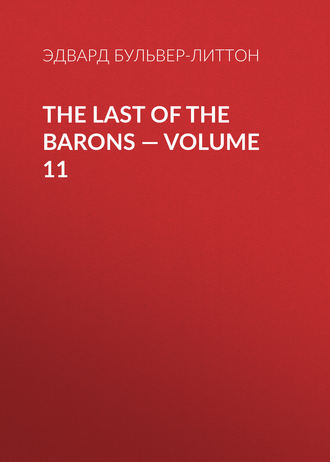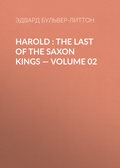
Эдвард Бульвер-Литтон
The Last of the Barons — Volume 11
Without presuming to decide which policy, upon the whole, would have been the happier for England,—the one that based a despotism on the middle class, or the one that founded an aristocracy upon popular affection,—it was clear to the more enlightened burgesses of the great towns, that between Edward of York and the Earl of Warwick a vast principle was at stake, and the commercial king seemed to them a more natural ally than the feudal baron; and equally clear it is to us, now, that the true spirit of the age fought for the false Edward, and against the honest earl.
Warwick did not, however, apprehend any serious results from the passive distaste of the trading towns. His martial spirit led him to despise the least martial part of the population. He knew that the towns would not rise in arms so long as their charters were respected; and that slow, undermining hostility which exists only in opinion, his intellect, so vigorous in immediate dangers, was not far-sighted enough to comprehend. More direct cause for apprehension would there have been to a suspicious mind in the demeanour of the earl's colleague in the Protectorate,—the Duke of Clarence. It was obviously Warwick's policy to satisfy this weak but ambitious person. The duke was, as before agreed, declared heir to the vast possessions of the House of York. He was invested with the Lieutenancy of Ireland, but delayed his departure to his government till the arrival of the Prince of Wales. The personal honours accorded him in the mean while were those due to a sovereign; but still the duke's brow was moody, though, if the earl noticed it, Clarence rallied into seeming cheerfulness, and reiterated pledges of faith and friendship.
The manner of Isabel to her father was varying and uncertain: at one time hard and cold; at another, as if in the reaction of secret remorse, she would throw herself into his arms, and pray him, weepingly, to forgive her wayward humours. But the curse of the earl's position was that which he had foreseen before quitting Amboise, and which, more or less, attends upon those who from whatever cause suddenly desert the party with which all their associations, whether of fame or friendship, have been interwoven. His vengeance against one had comprehended many still dear to him. He was not only separated from his old companions in arms, but he had driven their most eminent into exile. He stood alone amongst men whom the habits of an active life had indissolubly connected, in his mind, with recollections of wrath and wrong. Amidst that princely company which begirt him, he hailed no familiar face. Even many of those who most detested Edward (or rather the Woodvilles) recoiled from so startling a desertion to the Lancastrian foe. It was a heavy blow to a heart already bruised and sore, when the fiery Raoul de Fulke, who had so idolized Warwick, that, despite his own high lineage, he had worn his badge upon his breast, sought him at the dead of night, and thus said,—
"Lord of Salisbury and Warwick, I once offered to serve thee as a vassal, if thou wouldst wrestle with lewd Edward for the crown which only a manly brow should wear; and hadst thou now returned, as Henry of Lancaster returned of old, to gripe the sceptre of the Norman with a conqueror's hand, I had been the first to cry, 'Long live King Richard, namesake and emulator of Coeur de Lion!' But to place upon the throne yon monk-puppet, and to call on brave hearts to worship a patterer of aves and a counter of beads; to fix the succession of England in the adulterous offspring of Margaret, the butcher-harlot [One of the greatest obstacles to the cause of the Red Rose was the popular belief that the young prince was not Henry's son. Had that belief not been widely spread and firmly maintained, the lords who arbitrated between Henry VI. and Richard Duke of York, in October, 1460, could scarcely have come to the resolution to set aside the Prince of Wales altogether, to accord Henry the crown for his life, and declare the Duke of York his heir. Ten years previously (in November, 1450), before the young prince was born or thought of, and the proposition was really just and reasonable, it was moved in the House of Commons to declare Richard Duke of York next heir to Henry; which, at least, by birthright, he certainly was; but the motion met with little favour and the mover was sent to the Tower.]; to give the power of the realm to the men against whom thou thyself hast often led me to strive with lance and battle-axe, is to open a path which leads but to dishonour, and thither Raoul de Fulke follows not even the steps of the Lord of Warwick. Interrupt me not! speak not! As thou to Edward, so I now to thee, forswear allegiance, and I bid thee farewell forever!"
"I pardon thee," answered Warwick; "and if ever thou art wronged as I have been, thy heart will avenge me. Go!" But when this haughty visitor was gone, the earl covered his face with his hands, and groaned aloud. A defection perhaps even more severely felt came next. Katherine de Bonville had been the earl's favourite sister; he wrote to her at the convent to which she had retired, praying her affectionately to come to London, "and cheer his vexed spirit, and learn the true cause, not to be told by letter, which had moved him to things once farthest from his thought." The messenger came back, the letter unopened; for Katherine had left the convent, and fled into Burgundy, distrustful, as it seemed to Warwick, of her own brother. The nature of this lion-hearted man was, as we have seen, singularly kindly, frank, and affectionate; and now in the most critical, the most anxious, the most tortured period of his life, confidence and affection were forbidden to him. What had he not given for one hour of the soothing company of his wife, the only being in the world to whom his pride could have communicated the grief of his heart, or the doubts of his conscience! Alas! never on earth should he hear that soft voice again! Anne, too, the gentle, childlike Anne, was afar; but she was happy,—a basker in the brief sunshine, and blind to the darkening clouds. His elder child, with her changeful moods, added but to his disquiet and unhappiness. Next to Edward, Warwick of all the House of York had loved Clarence, though a closer and more domestic intimacy had weakened the affection by lessening the esteem. But looking further into the future, he now saw in this alliance the seeds of many a rankling sorrow. The nearer Anne and her spouse to power and fame, the more bitter the jealousy of Clarence and his wife. Thus, in the very connections which seemed most to strengthen his House, lay all which must destroy the hallowed unity and peace of family and home.
The Archbishop of York had prudently taken no part whatever in the measures that had changed the dynasty. He came now to reap the fruits; did homage to Henry VI., received the Chancellor's seals, and recommenced intrigues for the Cardinal's hat. But between the bold warrior and the wily priest there could be but little of the endearment of brotherly confidence and love. With Montagu alone could the earl confer in cordiality and unreserve; and their similar position, and certain points of agreement in their characters, now more clearly brought out and manifest, served to make their friendship for each other firmer and more tender, in the estrangement of all other ties, than ever it had been before. But the marquis was soon compelled to depart from London, to his post as warden of the northern marches; for Warwick had not the rash presumption of Edward, and neglected no precaution against the return of the dethroned king.
So there, alone, in pomp and in power, vengeance consummated, ambition gratified, but love denied; with an aching heart and a fearless front; amidst old foes made prosperous, and old friends alienated and ruined, stood the king-maker! and, day by day, the untimely streaks of gray showed more and more amidst the raven curls of the strong man.
CHAPTER III.
FURTHER VIEWS INTO THE HEART OF MAN, AND THE CONDITIONS OF POWER
But woe to any man who is called to power with exaggerated expectations of his ability to do good! Woe to the man whom the populace have esteemed a popular champion, and who is suddenly made the guardian of law! The Commons of England had not bewailed the exile of the good earl simply for love of his groaning table and admiration of his huge battle-axe,—it was not merely either in pity, or from fame, that his "name had sounded in every song," and that, to use the strong expression of the chronicler, the people "judged that the sun was clearly taken from the world when he was absent."
They knew him as one who had ever sought to correct the abuses of power, to repair the wrongs of the poor; who even in war had forbidden his knights to slay the common men. He was regarded, therefore, as a reformer; and wonderful indeed were the things, proportioned to his fame and his popularity, which he was expected to accomplish; and his thorough knowledge of the English character, and experience of every class,—especially the lowest as the highest,—conjoined with the vigour of his robust understanding, unquestionably enabled him from the very first to put a stop to the lawless violences which had disgraced the rule of Edward. The infamous spoliations of the royal purveyors ceased; the robber-like excesses of the ruder barons and gentry were severely punished; the country felt that a strong hand held the reins of power. But what is justice when men ask miracles? The peasant and mechanic were astonished that wages were not doubled, that bread was not to be had for asking, that the disparities of life remained the same,—the rich still rich, the poor still poor. In the first days of the revolution, Sir Geoffrey Gates, the freebooter, little comprehending the earl's merciful policy, and anxious naturally to turn a victory into its accustomed fruit of rapine and pillage, placed himself at the head of an armed mob, marched from Kent to the suburbs of London, and, joined by some of the miscreants from the different Sanctuaries, burned and pillaged, ravished and slew. The earl quelled this insurrection with spirit and ease; [Hall, Habington] and great was the praise he received thereby. But all-pervading is the sympathy the poor feel for the poor. And when even the refuse of the populace once felt the sword of Warwick, some portion of the popular enthusiasm must have silently deserted him.
Robert Hilyard, who had borne so large a share in the restoration of the Lancastrians, now fixed his home in the metropolis; and anxious as ever to turn the current to the popular profit, he saw with rage and disappointment that as yet no party but the nobles had really triumphed. He had longed to achieve a revolution that might be called the People's; and he had abetted one that was called "the Lord's doing." The affection he had felt for Warwick arose principally from his regarding him as an instrument to prepare society for the more democratic changes he panted to effect; and, lo! he himself had been the instrument to strengthen the aristocracy. Society resettled after the storm, the noble retained his armies, the demagogue had lost his mobs! Although through England were scattered the principles which were ultimately to destroy feudalism, to humble the fierce barons into silken lords, to reform the Church, to ripen into a commonwealth through the representative system,—the principles were but in the germ; and when Hilyard mingled with the traders or the artisans of London, and sought to form a party which might comprehend something of steady policy and definite object, he found himself regarded as a visionary fanatic by some, as a dangerous dare-devil by the rest. Strange to say, Warwick was the only man who listened to him with attention; the man behind the age and the man before the age ever have some inch of ground in common both desired to increase liberty; both honestly and ardently loved the masses; but each in the spirit of his order,—Warwick defended freedom as against the throne, Hilyard as against the barons. Still, notwithstanding their differences, each was so convinced of the integrity of the other,—that it wanted only a foe in the field to unite them as before. The natural ally of the popular baron was the leader of the populace.
Some minor, but still serious, griefs added to the embarrassment of the earl's position. Margaret's jealousy had bound him to defer all rewards to lords and others, and encumbered with a provisional council all great acts of government, all grants of offices, lands, or benefits. [Sharon Turner] And who knows not the expectations of men after a successful revolution? The royal exchequer was so empty that even the ordinary household was suspended; [See Ellis: Original Letters from Harleian Manuscripts, second series, vol. i., letter 42.] and as ready money was then prodigiously scarce, the mighty revenues of Warwick barely sufficed to pay the expenses of the expedition which, at his own cost, had restored the Lancastrian line. Hard position, both to generosity and to prudence, to put off and apologize to just claims and valiant service!
With intense, wearying, tortured anxiety, did the earl await the coming of Margaret and her son. The conditions imposed on him in their absence crippled all his resources. Several even of the Lancastrian nobles held aloof, while they saw no authority but Warwick's. Above all, he relied upon the effect that the young Prince of Wales's presence, his beauty, his graciousness, his frank spirit— mild as his fathers, bold as his grandsire's—would create upon all that inert and neutral mass of the public, the affection of which, once gained, makes the solid strength of a government. The very appearance of that prince would at once dispel the slander on his birth. His resemblance to his heroic grandfather would suffice to win him all the hearts by which, in absence, he was regarded as a stranger, a dubious alien. How often did the earl groan forth, "If the prince were but here, all were won!" Henry was worse than a cipher,—he was an eternal embarrassment. His good intentions, his scrupulous piety, made him ever ready to interfere. The Church had got hold of him already, and prompted him to issue proclamations against the disguised Lollards, which would have lost him at one stroke half his subjects. This Warwick prevented, to the great discontent of the honest prince. The moment required all the prestige that an imposing presence and a splendid court could bestow. And Henry, glad of the poverty of his exchequer, deemed it a sin to make a parade of earthly glory. "Heaven will punish me again," said he, meekly, "if, just delivered from a dungeon, I gild my unworthy self with all the vanities of perishable power."







